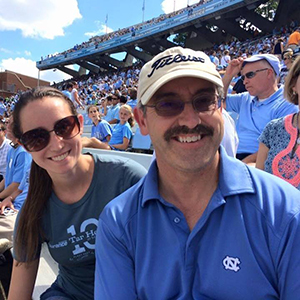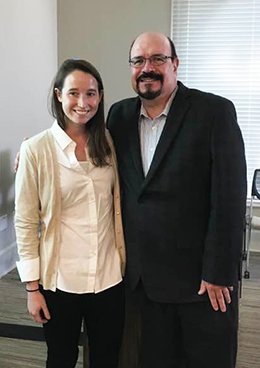Meghan Jones, Ph.D. is a graduate of our Behavioral and Integrative Neuroscience program in the Department of Psychology and Neuroscience. She is now a Postdoctoral Researcher at The Scripps Research Institute (TSRI).
 As a postdoctoral research at TSRI, Meghan runs experiments designed to understand the neurobiological mechanisms driving susceptibility and resilience to trauma. Meghan works in Dr. Courtney Miller’s laboratory. She says, “My position at Scripps allows me to gain more training in running both behavoral and molecular experiments, while continuing to work on a topic I am passionate about.”
As a postdoctoral research at TSRI, Meghan runs experiments designed to understand the neurobiological mechanisms driving susceptibility and resilience to trauma. Meghan works in Dr. Courtney Miller’s laboratory. She says, “My position at Scripps allows me to gain more training in running both behavoral and molecular experiments, while continuing to work on a topic I am passionate about.”
Her graduate training in Dr. Donald Lysle’s laboratory was critical in preparation for her new role at Scripps. “I gained extensive experience in behavioral assays of fear and anxiety in rodents, including stress-enhanced fear learning, elevated plus maze, acoustic startle response tests, and open field texts,” Meghan explains. “My time working with Dr. Lysle prepared me extremely well. I have been able to use these skills and build upon them at Scripps. In addition, my graduate training at UNC gave me skills in grant writing, manuscript writing, and professional networking – all of which helped me earn my position at Scripps.”
 Choosing a graduate program that matches one’s future goals is important. Meghan ultimately chose Carolina because of the work being done in the Lysle Lab and the collaborative research environment. “I was super excited about the Lysle Lab’s findings of the influence of opioid signaling on the development of a post-traumatic stress disorder-like phenotype in rodents and was eager to contribute, and to learn more,” Meghan shares. “In addition the faculty of the Behavioral and Integrative Neuroscience program were extremely supportive of their graduate students.” In particular, department-wide seminars and discussions were a plus for Meghan. She says, “They provided a great environment to ask questions and to receive feedback on your work from all faculty, not just your advisor. As a result, faculty members Regina Carelli and Kathryn Reissner became strong female mentors for me and provided invaluable perspectives on being a woman in the sciences.”
Choosing a graduate program that matches one’s future goals is important. Meghan ultimately chose Carolina because of the work being done in the Lysle Lab and the collaborative research environment. “I was super excited about the Lysle Lab’s findings of the influence of opioid signaling on the development of a post-traumatic stress disorder-like phenotype in rodents and was eager to contribute, and to learn more,” Meghan shares. “In addition the faculty of the Behavioral and Integrative Neuroscience program were extremely supportive of their graduate students.” In particular, department-wide seminars and discussions were a plus for Meghan. She says, “They provided a great environment to ask questions and to receive feedback on your work from all faculty, not just your advisor. As a result, faculty members Regina Carelli and Kathryn Reissner became strong female mentors for me and provided invaluable perspectives on being a woman in the sciences.”
Reflecting on her time at UNC, Meghan believes her faculty mentors were critical in aiding her success. “Dr. Lysle was the best mentor ever,” she explains. “He was supportive and helpful, but also gave me space to pursue my own ideas. He encouraged independent thinking and taking risks.” Her advice for students considering a Ph.D. is to follow your research passions! “Graduate school is a lot of work, so being genuinely interested in the research questions you’re asking is critical,” Meghan says. “I am not sure what my ultimate career will be yet, but UNC helped me secure a postdoctoral position that will prepare me for a career in either industry and academia – and I get to do the research that I care about while I figure it out.”

